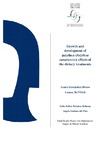Identificador persistente para citar o vincular este elemento:
https://accedacris.ulpgc.es/jspui/handle/10553/75062
| Título: | Growth and developmentof palythoa (Palythoa canariensis) : effects of the dietary treatments | Autores/as: | Hernández Rivero, Laura | Director/a : | Robaina Robaina, Lidia Esther Santana Del Pino, Ángelo |
Clasificación UNESCO: | 251092 Acuicultura marina | Palabras clave: | Palythoa canariensis | Fecha de publicación: | 2018 | Proyectos: | R+D+I Towards aquaponic development in the up islands and the circular economy | Resumen: | Palythoa canariensis is a soft coral endemic to the Canary Islands. Previous studies show that this species adapts well to culture conditions and, like other species of the genus Palythoa, produces palytoxin. From previous studies blue light resulted in best animal performance although the growth of the animals difficult to define due to the appearance of polyps. In present study, for the first time, 2 specific diets for this species were assayed against blue light and 2 different depths of the aquariums on the growth of the animals. A feed formulation based on a common commercial aquarium feed was prepared and used as a control and, based on that, a source of bioactive polyphenols well know as growth and health promoters was included in a second diet. Aloe vera byproduct, locally generated from the aloe gel production, was selected as key ingredient in present case and after processing and analysis included at a 2% in the formula feed. Results showed that the greatest increase in weight and the highest number of polyps was obtained for the control diet and the lower depth 13 cm. As contaminants did not differ among diets, this indicates a possible negative effect of the dietary polyphenol content on the growth and development of these animals, which should be deepened in subsequent studies. | Departamento: | Departamento de Biología Departamento de Matemáticas |
Facultad: | Facultad de Ciencias del Mar | Titulación: | Grado en Ciencias del Mar | URI: | https://accedacris.ulpgc.es/handle/10553/75062 |
| Colección: | Trabajo final de grado Restringido ULPGC |
En el caso de que no encuentre el documento puede ser debido a que el centro o las/os autoras/es no autorizan su publicación. Si tiene verdadero interés en el contenido del mismo, puede dirigirse al director/a o directores/as del trabajo cuyos datos encontrará más arriba.
Vista completaVisitas
53
actualizado el 11-ene-2026
Descargas
18
actualizado el 11-ene-2026
Google ScholarTM
Verifica
Comparte
Exporta metadatos
Los elementos en ULPGC accedaCRIS están protegidos por derechos de autor con todos los derechos reservados, a menos que se indique lo contrario.
